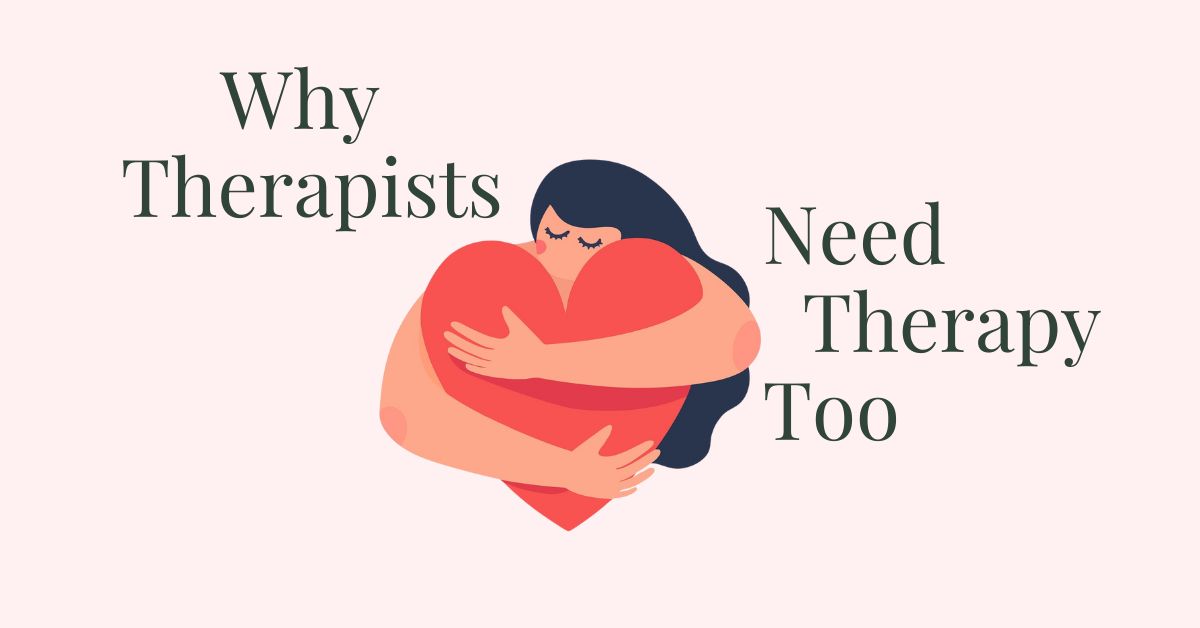Let’s start with the obvious: being a therapist doesn’t make us immune to struggle.
In fact, in some ways, it might make us more vulnerable.
We hold space for others. We absorb their trauma, sit in their grief, and celebrate their breakthroughs. We track feelings, attune to nonverbals, formulate interventions, and—if we’re being honest—sometimes forget to eat lunch or go to the bathroom in the process.
We teach our clients to feel their feelings, to slow down, to ask for help. And yet? Many of us still hesitate to do the same for ourselves.
“Shouldn’t I know better?”
Even as a therapist who treats therapists, I’ll admit it—I’ve had plenty of moments where I’ve thought: “I shouldn’t be struggling with anxiety, or depression, or burnout. I am a therapist for a living. What does it say about me if I’m not okay?”
The myth of the emotionally invincible therapist
Somewhere along the way, a myth got woven into the profession: that we, the trained ones, shouldn’t need the same kind of support we offer.
But here’s the truth:
Therapists are human.
We are shaped by our pasts, stirred by our clients, and (whether we admit it or not) often walking the same roads we help others navigate.
And pretending otherwise doesn’t make us better clinicians—it makes us more alone.

What the research says (spoiler: we need it)
Personal therapy isn’t just a “nice-to-have” for therapists. It’s shown to be deeply impactful—both professionally and personally.
According to Norcross & Guy (2007), over 80% of psychologists have participated in therapy at some point in their careers. Those who did reported greater emotional resilience, professional satisfaction, and self-awareness.
Therapists who engage in therapy have also been rated by their clients as more effective (Orlinsky et al., 2011). Why? Because they’ve sat in the other chair. They’ve felt the discomfort of being vulnerable, of being seen, of not having the answers.
Freud himself believed every therapist should be analyzed before practicing. In some countries, it’s still required.
In the U.S., not so much. But that doesn’t mean it isn’t vital.
Why therapy matters for therapists
So… why do therapists need therapy?
Here’s a non-exhaustive list:
- To process the emotional residue of the work
- To explore transference and countertransference
- To make space for grief, anger, and unmet needs
- To navigate personal life stressors that inevitably show up in the therapy room
- To prevent burnout, vicarious trauma, and compassion fatigue
- To remember what it feels like to be the client
What gets in the way?
Even though we know the benefits, many therapists hesitate to seek therapy. We worry:
- “What if my therapist knows someone I supervise?”
- “What if I’m seen as less competent?”
- “What if I feel less competent just by needing help?”
And then there’s the scheduling, the cost, and the mind-numbing irony of trying to find a therapist as a therapist. (“No CBT, no solution-focused, someone who’s trauma-informed but not performatively so, group-experienced but not Yalom-y…”)
Trust me—we get it.
At Therapy for Therapists, we specialize in… well, you.
We’re a collective of PSYPACT-licensed psychologists offering:
- Individual therapy tailored to the needs of therapists
- Process-oriented group therapy with other clinicians
- Psychological testing (ADHD, personality, and neurodivergence)
Whether you’re wrestling with imposter syndrome, feeling stuck in your own growth, or simply craving a space where you don’t have to hold it all—we’re here.We’re not here to fix you.
We’re here to help you be more you. The real kind. The slightly tired, very thoughtful, deeply human version of you.
If you’ve been wondering whether you “need” therapy, consider this:
- Do you ever feel emotionally spent after a full caseload—but tell yourself to push through?
- Do you sometimes feel like an imposter in work you once felt confident doing?
- Do you struggle to access your own inner world after spending all day in everyone else’s?
If so, you’re not broken.
You’re just a therapist who’s ready to be a client again.
And honestly? You deserve nothing less.
Final thoughts: it’s not indulgent—it’s essential
Therapy for therapists isn’t about ego or indulgence.
It’s about sustainability. It’s about ethics. It’s about reclaiming the same kind of healing we help others find.
If you’re ready for a space where the emotional labor ends at the door, we invite you to take the next step.
Let’s talk about what support could look like when the space is finally yours.
